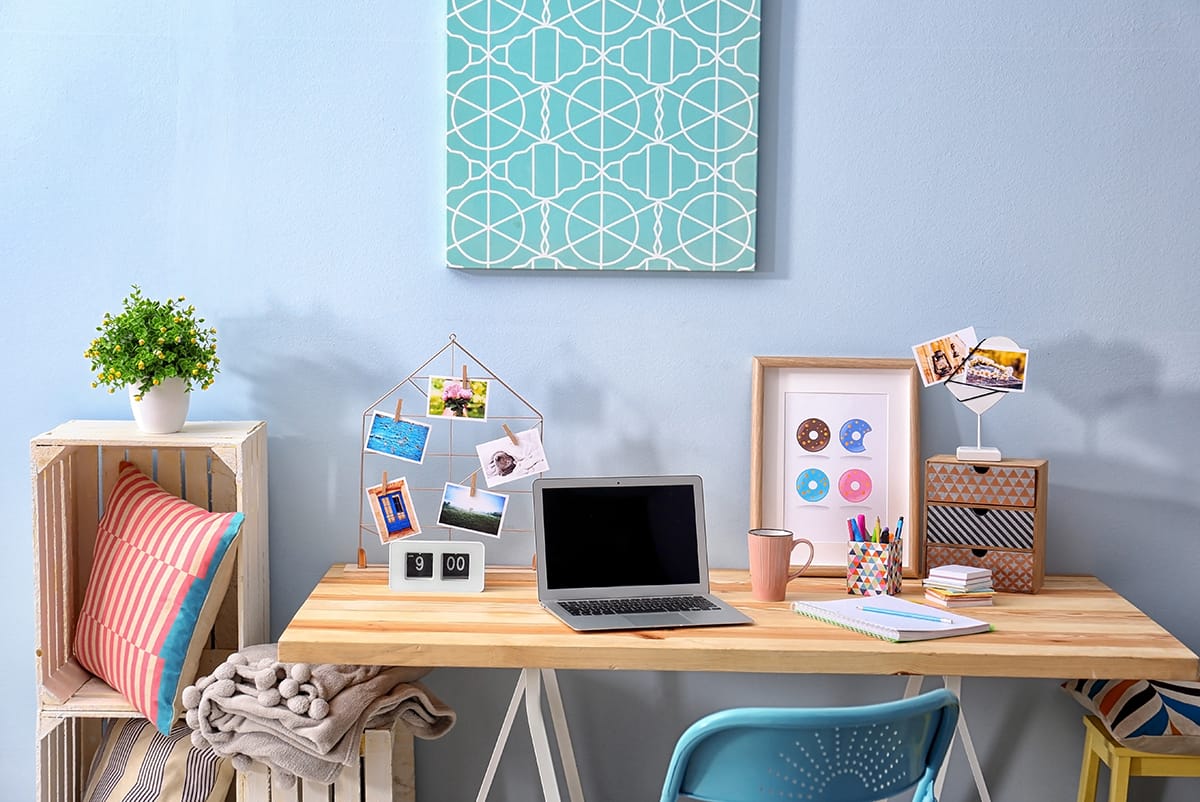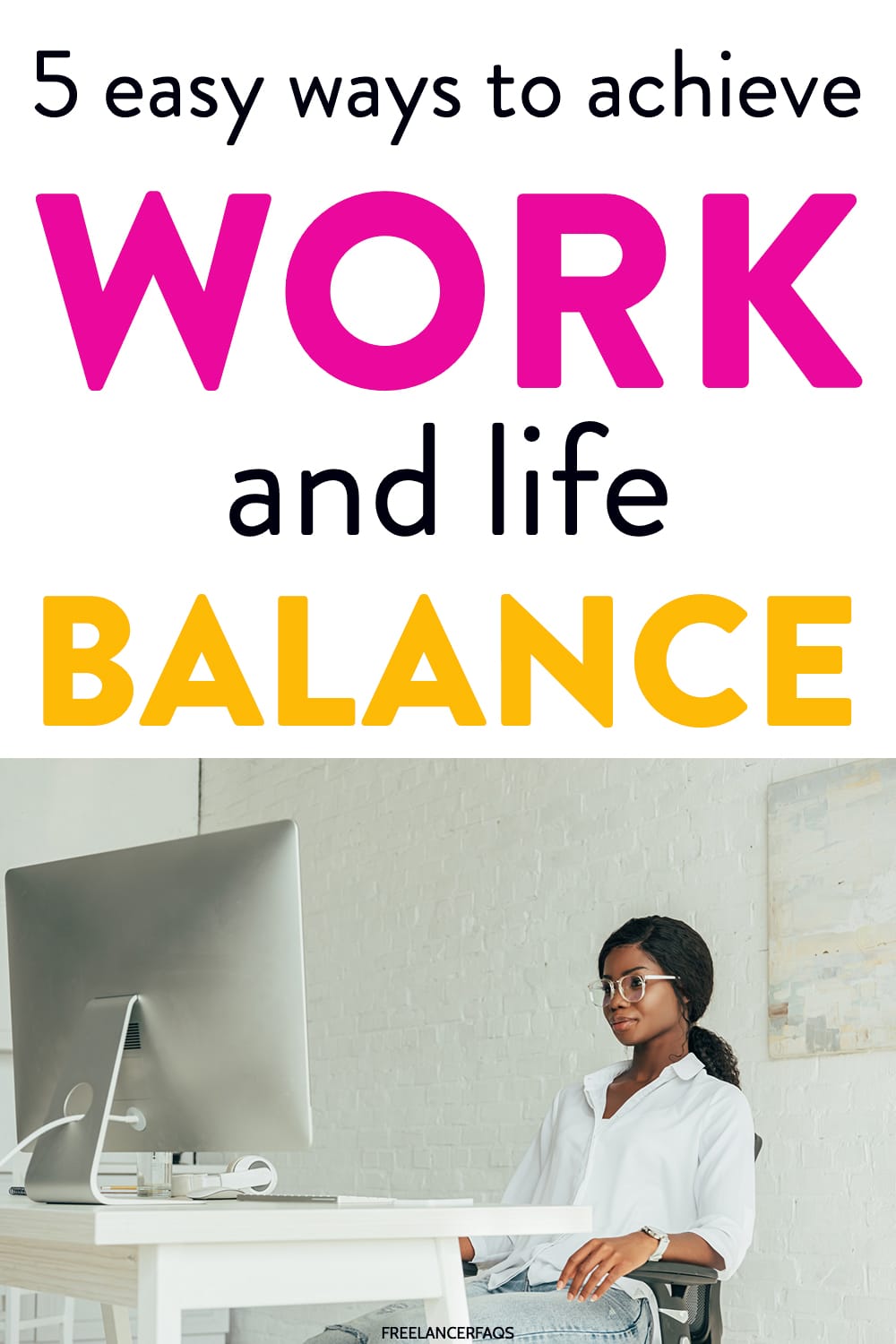What does work and life balance look like for freelancers?
If what comes to mind is spending a few hours typing brilliant blog posts or creating a clients’ websites and then spending the rest of their day on the beach then you’re wrong.

Unlike people who work 9-5 jobs, you don’t get to shut down and head off into the world leaving work behind.
Running a freelance service feels like you’re getting plunged into a whirlpool.
- Sending out endless emails with pitches
- Outlining content and then writing down concise ideas
- Getting on calls with prospects and turning them into customers
The list goes on.
And since you control your hours and work and life balance, there’s hardly a moment when you wouldn’t feel like there’s freelance work to be done.
Unlike people who work 9-5 jobs, you don’t get to shut down and head off into the world leaving work behind. It’s always tempting to stay on your laptop for just one more hour.
When I started freelancing I was anxious to land high paying clients that would value my work. To do that, I’d cold pitch for hours and then work on the few projects I had. It felt wrong for me to sit and do nothing. I had to be building my business every minute. A month passed and I felt burnt out.
So I decided to get help. I reached out to freelancers in my Twitter network about how they’ve created a work and life balance and how they avoid freelance burnouts.
Here are the simple and practicable tips they use to have work and life balance as a freelancer.
Work-Life Balance

1. Put Your Phone in a Drawer
Have you caught yourself staring at a client’s email while pretending to listen to your partner on a Saturday evening?
Here’s the thing –
Freelance work never goes away.
There is always something to do. And you could end up spending your weekend getting it done and then wake up. This isn’t the best for work-life balance.
Time will slip away and you’ll realize it is Monday morning. Again. At some point, you’ve to turn off the devices that you use for work or delete them when they’re not in use.
To stop work from creeping into her weekend, Nicole Slaughter Graham, a freelancer says,
“I had to delete email and social apps from my phone for a time.”
If deleting work apps seems a bit too drastic, try turning off notifications after work hours or using app blockers.
Most smartphones have options for digital wellbeing that let you have “me time.”
Here’s a list of apps that can help you regulate your screen time:
And if you find yourself reaching for your phone to take a peek at what’s going on Andre Spiteri, a fintech writer suggests that you should pop it in the drawer. Out of sight is out of mind right?
2. Switch Off and “Go Home”
Most people who get to work in an office, leave work behind as they exit the building.
Most freelancers don’t have that luxury.
Your commute is probably limited to the few feet between your work area and the rest of your home.
Sally Fox, an eco copywriter advises that freelance writers should be intentional about getting off work. To do this she says,
“[S]chedule an activity to mark the end of the working day. (Exercise is a good one.) I’ve also heard of people taking a walk around the block to act as a ‘commute’.”
3. Carve Out a Workspace
If you work everywhere in your home, it will be hard not to pull out your laptop while lying down to do one quick thing. And this doesn’t scream work and life balance, now does it?
And we know that “one quick thing” usually stretches on for longer than anticipated. While you’re typing in bed, remember you’re harming your back.
To avoid this and created a more work and life balance Nicole Slaughter Graham created a workspace in her home.
She doesn’t do work on the couch or in bed and she restricts work to a little corner set up in the house.
Doing this helps you leave work when you leave your desk the way Lisa, a marketing manager at Traction Guest does.
In her case, space division is fundamental for work-life balance.
4. Create Work Hours and Stick to Them
 The best thing about freelancing is that you determine your hours.
The best thing about freelancing is that you determine your hours.
The bad part is that you could go overboard by having irregular hours or not having hours at all.
Instead of working when you feel like it and not achieving work and life balance, Priyanka Desai, writer, and CEO of iScribblers advises freelance writers to define their work hours and stick to them.
But doing this is not enough, you need to go a step further and let the clients know about the times you’ll be available.
And this definitely requires you to be firm which is hard for a lot of times.
But remember you’re a professional bringing value to your client and they need you as much you need them.
You also have to have a good amount of discipline so you can ignore that email that arrives on Friday evening just when you’re shutting down your PC.
Micheal Garret, PR consultant, and freelancer schedules work hours she tries to adhere to.
When she checks her phone and sees an email or text from a client outside those hours, she waits to answer till the next day (unless it’s truly an emergency).
It helps to define what constitutes an emergency and what does not beforehand and that work and life balance.
It helps you to handle micromanaging clients who tend to blow things out of proportion. And after making these rules, you should tell your clients about them.
Robin Santa Maria, a freelancer says
“I don’t reply to emails on weekends. I often ignore my inbox from Friday pm to Monday am. I’m clear with clients that I work weekdays only unless there’s an emergency (to date, the only one was at the start of the pandemic, which was understandable for what they needed).”
But then what about clients that think you should be available all the time?
Katie Barber, a digital marketing freelancer, says she solved this by choosing not to work with the type of clients who would freak out if she didn’t reply on a weekend.
But sometimes choosing who and who not to work with seems like a luxury for most new freelancers.
As hard as it may seem you’ve to take control of how you work. Remember that you can push back or just work away from clients who do not know how to work with boundaries.
If you’re just starting out and don’t exactly have the pick of the crop, keep working towards that and weeding out clients from hell.
Know when it is time to switch off and “go home.”
Because you don’t leave the house and are surrounded by family members you might be tempted to think that a few quick glances at them during the day counts as family time.
5. Exercise and Care for Your Mental Health
Working from home doesn’t require a lot of movement.
Which is a plus for all of us who hate commuting. But the physical movement is an important form of exercise for your body especially if you spend most of it in a chair.
To stay sane and healthy and work that work and life balance, Robin Santa Maria says that she makes time to read and exercise every day.
Overworking yourself to the detriment of your physical and mental health does not help anybody.
Taking walks, exercising, and reading books outside work keeps you curious and creative. Your mind has time to make connections it would have if you’re stuck in front of a laptop for hours.
Our mental and physical health does matter as freelancers. It’s harder to write when you’re ill, sad, or just plain tired.
Work and Life Balance Changes
There will be times when your attempt to balance life and work will fail. During the pandemic, setting work hours when you’ve kids running around is hard and almost near impossible.
The truth is that you may need to work at irregular hours.
Stephanie Mickelson, a freelancer says,
“I try and be really present with what I’m doing at the moment which is usually providing snuggles or snacks. That’s not to say I don’t sneak a peek when I get an email, but that’s more to plan what needs to be done during naptime.”
Being flexible and planning work around free time is your best bet.
When I stayed with my sister for a month, I worked at night when my boisterous nephews had gone to bed.
During the day, I slept alot and played with them.
And knowing that you really don’t work at a 9-5 job and that you can turn any day into a weekend for yourself is the best part of being a freelancer.
Just like Michelle Garett, you should see your days as flexible and adapt them to suit your circumstances. She says,
“I like that I can work the hours that work for me that particular day. That means sometimes I do work evenings & weekends-but I can take off in the middle of a weekday afternoon to take care of something, too.”
And on days that work gets crazy and you feel like the balance is slipping, accept it and don’t beat yourself up. Devani Anjali, writer, and CEO of Libertyvas has days like this,
“Some days, I’m able to remove myself and do “life” things. Other days, deadlines require everything I’ve got and I play double-dutch with the line till I can take a breather.”
Work-life balance might not include lounging on beaches during your free time.
It could be as simple as how Anfernee Chansamooth, writer and community lead at Bean Ninjas describes it; learning to switch off, getting off devices, and being present for your loved ones (or yourself).
Over to you – how to you handle work and life balance?



Leave a Reply